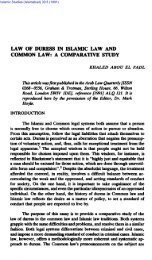ORPHANED GRANDCHILDREN IN ISLAMIC SUCCESSION LAW
ORPHANED GRANDCHILDREN IN ISLAMIC SUCCESSION LAW
ORPHANED GRANDCHILDREN IN ISLAMIC SUCCESSION LAW
Create successful ePaper yourself
Turn your PDF publications into a flip-book with our unique Google optimized e-Paper software.
<strong>ORPHANED</strong> <strong>GRANDCHILDREN</strong> <strong>IN</strong> <strong>ISLAMIC</strong> <strong>SUCCESSION</strong> <strong>LAW</strong> 271<br />
Case 7<br />
One further case deserves consideration and that is where it<br />
might at first appear that the 1961 law also affects the Qur'gnic<br />
share and this is when P is survived by a daughter A, the child B of<br />
a predeceased second daughter, and C, a distant agnatic cousin.<br />
Under classical law, A and C would have received 4 each, the<br />
grandchild B receiving nothing, but under both the 1946 law (by<br />
all three methods) and the 1961 law P's net estate is shared equally<br />
in thirds by A, B and C.<br />
Yet, in fact, the 1961 law is complying with the minimum for<br />
daughters prescribed by the Qur'iin, when more than one, namely<br />
213 which is to be shared amongst them as was the case until the<br />
second daughter died. The Qur'anic share which A originally<br />
expected to receive (of 4 of 213) she continues to receive and by<br />
the death of her sister, B's mother, she is not enabled (under the<br />
1961 law) to gain the sort of benefit which she would have<br />
expected to receive if she had been the only child throughout,<br />
namely 3 of the net estate and the orphaned grandchild B assumes<br />
by right his or her mother's share.<br />
Under both the 1946 and 1961 laws, the amount received by the<br />
distant agnatic cousin is a more accurate reflection of his relation-<br />
ship to the deceased propositus (namely 113) then the half portion<br />
allotted to him in the classical system at the expense of the<br />
propositus' own direct descendants.<br />
V. Summary<br />
It is unnecessary to recapitulate here all the reasons which have<br />
impelled an increasing number of Muslim countries to provide by<br />
law for orphaned grandchildren who were excluded from inheriting,<br />
under classical interpretations of Islamic law, from their grandparent<br />
in the presence of a Iiving brother of their deceased parent.<br />
It is sufficient to recall that Islam places great emphasis on the<br />
family as the foundation for a healthy community and seeks to<br />
preserve this family against the inroads of tribalism on one side and<br />
an unbridled individualism, on the other. The family has also been<br />
increasingly affected by the changing nature of society produced by<br />
the growth of impersonal cities, an industrial civilization and a<br />
constant movement of population, which changes have adversely<br />
affected the protection afforded to orphaned children by their
















